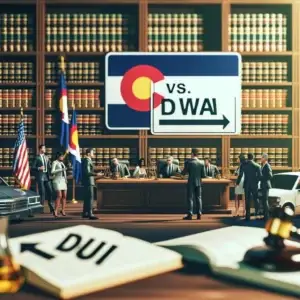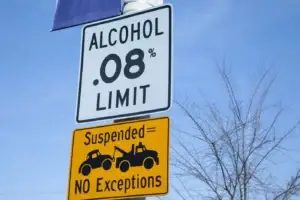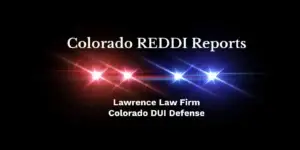A Fourth DUI in Colorado: What Repeat Offenders Need to Know
Most DUI cases in Colorado are charged as misdemeanors. But once a person reaches their fourth DUI conviction, the law treats things very differently. A 4th DUI offense in Colorado is no longer just another misdemeanor — it is a class 4 criminal offense that carries mandatory jail or prison consequences, long-term probation, and heavy fines.
Understanding how courts handle repeat DUI charges is critical for anyone facing a fourth, fifth, or subsequent impaired driving case.
How Colorado Defines DUI and DWAI
Colorado law makes it illegal to operate a motor vehicle while under the influence of alcohol, drugs, or a combination of both.
DUI (Driving Under the Influence): Driving while substantially impaired.
DWAI (Driving While Ability Impaired): Driving while affected “to the slightest degree” by alcohol or drugs.
DUID (Driving Under the Influence of Drugs): Covers impairment by controlled substances, including prescription medications or marijuana.
A person can be convicted of DUI or DWAI even if they were not driving at the time of arrest, so long as they were in actual physical control of the vehicle.
When a DUI Becomes More Serious
Normally, a first, second, or third DUI is treated as a misdemeanor. However, a fourth DUI conviction in Colorado is elevated to a class 4 offense. That means a person with three prior convictions — whether for DUI, DWAI, vehicular assault, or related impaired driving offenses — can be charged at this higher level.
Importantly, these prior convictions count for life. It doesn’t matter whether they occurred five years ago or 25 years ago. If there are three qualifying convictions anywhere in the U.S., the fourth will be treated as a felony-level offense under Colorado law.
Mandatory Minimum Sentences for a Fourth DUI
Unlike earlier DUIs, which may result in probation and limited jail time, a fourth DUI conviction carries mandatory minimum sentences.
The court cannot waive these penalties. Judges may also impose additional time — up to two years of work release or even a Department of Corrections sentence ranging from two to six years, along with fines of up to $500,000.
It is important to remember: mandatory minimums are only the starting point. Many judges in Denver, Arapahoe County, and Adams County routinely impose penalties above the minimum when sentencing repeat DUI offenders.
Preliminary Hearings in Fourth DUI Cases
Because a fourth DUI charge qualifies as a felony-level offense, it comes with an important procedural protection: the right to a preliminary hearing.
At a preliminary hearing, the prosecution must establish that probable cause exists to move the case forward. The judge does not decide guilt or innocence but instead looks at the evidence in the light most favorable to the state.
Key points about preliminary hearings:
Hearsay evidence is admissible.
Police officers can testify about what others told them.
The prosecution must present evidence of three prior convictions to move forward.
If prosecutors cannot prove those prior convictions exist, the case may not survive this early hearing.
Evidence in Repeat DUI Cases
To prove a repeat DUI charge, prosecutors must show:
The defendant was operating a motor vehicle while impaired.
The defendant has at least three prior convictions.
Evidence often includes:
Officer testimony about driving behavior, odor of alcohol, or unsteady balance.
Field sobriety test performance.
Chemical test results (breath or blood) under Colorado’s express consent law.
Certified records of prior DUI convictions.
At trial, certified court records of prior convictions are required — police testimony or DMV printouts are not enough.
Challenges and Defenses to Fourth DUI Charges
Even when prior convictions exist, there are still defenses that can be raised in repeat DUI cases.
Challenging the Stop and Arrest
Was there a valid reason for the traffic stop?
Did officers properly administer field sobriety or chemical tests?
Were testing devices maintained and calibrated correctly?
Reviewing Body-Worn Cameras
Officers are required to use body-worn cameras in many DUI investigations. Reviewing the footage may reveal inconsistencies in observations or procedures.
Contesting Prior Convictions
Sometimes, old convictions may not qualify. For example, an out-of-state DUI law may differ from Colorado’s statute. An experienced DUI defense lawyer in Aurora or Denver can analyze whether those convictions can legally be used to enhance the new charge.
The Impact of Prior Convictions at Trial
One of the toughest aspects of a fourth DUI trial is that the jury will hear about prior convictions. Normally, evidence of prior bad acts is excluded to avoid bias. But in repeat DUI cases, jurors are explicitly told that the defendant has at least three previous impaired driving convictions.
This reality makes trial strategy complicated, since jurors may begin with a negative perception of the defendant.
Mitigation and Alternative Approaches
Because the penalties for a fourth DUI are so steep, mitigation can be just as important as trial strategy. This involves showing the court that the defendant is addressing the underlying issues that led to the charges.
Examples of mitigation include:
Enrolling in alcohol or drug treatment.
Attending therapy or counseling.
Participating in support programs like AA.
Documenting community involvement and family responsibilities.
Courts in Jefferson County, Douglas County, and Arapahoe County often respond positively when defendants demonstrate genuine steps toward rehabilitation.
Why Repeat DUI Charges Are So Serious
A fourth DUI conviction in Colorado is not just about serving jail time. The consequences extend far beyond sentencing:
A permanent felony-level record.
Difficulty securing employment or housing.
Loss of professional licenses.
Ongoing costs from fines, treatment, and monitoring.
The law reflects the view that multiple DUI convictions show a pattern of risk to public safety, and the penalties are designed to be severe.
Common Questions About Fourth DUI Cases
Do all prior DUIs count?
Yes. Prior convictions from other states or decades ago can count, as long as they are for DUI, DWAI, vehicular assault, or related impaired driving offenses.
Can I avoid mandatory jail?
No. Judges must impose at least the minimum sentence. However, alternatives like work release or treatment programs may be possible depending on the case.
Can a fourth DUI ever be reduced to a misdemeanor?
It is rare, but in some cases with weak evidence or questionable prior convictions, prosecutors may offer plea deals that reduce the severity of the charge.
Facing a Fourth DUI in Colorado?
If you are facing repeat DUI charges in Colorado, the stakes could not be higher. A fourth offense carries mandatory jail or prison, the possibility of years of probation, and lifelong consequences from a felony-level conviction.
At the Lawrence Law Firm, we represent clients charged with impaired driving offenses throughout the Denver metro area, including Aurora, Arapahoe County, Adams County, Jefferson County, and Douglas County. Our attorneys have years of experience challenging chemical tests, cross-examining officers, and negotiating outcomes that minimize penalties.
We offer free consultations and flexible payment plans. Call today to speak with a defense attorney who understands how to fight repeat DUI charges and protect your future.






